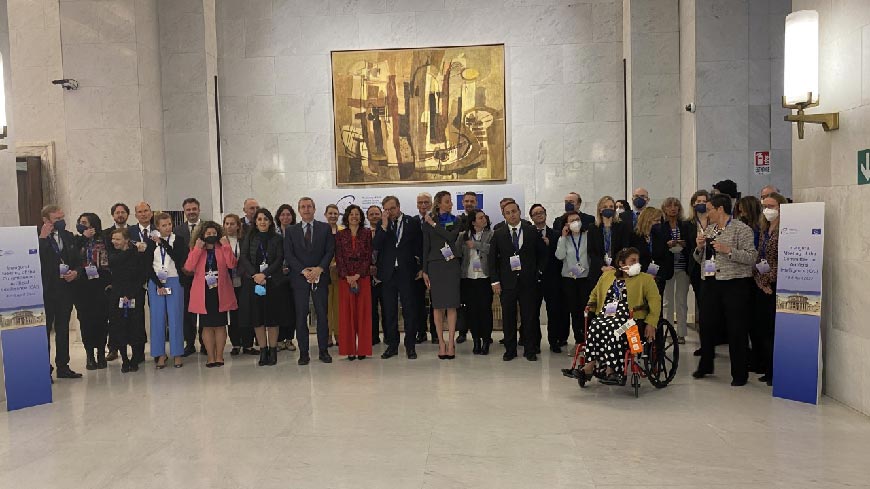Continue to stimulate technological innovation to foster the social and economic progress of our communities, while ensuring that Artificial Intelligence systems are designed, developed and applied in full respect of human rights, of democracy and the Rule of Law. This is what emerged following the High-Level event held on Monday 4th April at the Farnesina, co-organised by the Italian Presidency of the Committee of Ministers of the Council of Europe and the Council of Europe, which marked the opening of the Committee on Artificial Intelligence (CAI) of the Organisation, currently in progress.
In line with one of the three strategic objectives of the Italian Presidency, the promotion of a “person-friendly” future, the event was attended by representatives of the European Commission, as well as from the world of academia, from industry and from institutions. This signifies an important step in confirming Europe as a point of reference of excellence for the world.
"It is useful to remember that the so-called 'artificial intelligence revolution' is only a decade old, which means that the possibilities and scope of its application are multiple and yet to be explored", explained Undersecretary Benedetto Della Vedova, speaking at the opening of the Conference. "In the face of such a changing and rapidly evolving scene, national and international institutions are asked to focus their efforts on the definition and implementation of standards and tools that respond to the need to manage the risks posed by certain applications of artificial intelligence." A shared challenge and commitment to respond collectively to by developing oa legally binding, coherent and universal framework.
"We need to create a sustainable legal framework for Artificial Intelligence that extends across our continent and beyond," continued Deputy Secretary General of the Council of Europe Bjồrn Berge. "A new Convention that acts as a platform for cooperation and helps set important standards, just like the Budapest Convention on Cybercrime. (...) The work we are doing is a response to these needs, and part of this is the crucial task that the CAI, the new Commission on Artificial Intelligence, must carry out".
Hon. Alessandro Fusacchia, President of the Parliamentary Intergroup on Artificial Intelligence followed the opening speeches. He focused on three necessary aspects to reconcile risks and opportunities related to the development of Artificial Intelligence: attention to the non-polarisation of technological progress and the protection of human rights, which must go hand in hand; the development of an increasing awareness among younger generations, who will soon be the leaders in the process of digital revolution; training of public administrations, which will have to implement future legislation in this regard.
Then the guest speakers followed - moderated by Prof. Paola Pisano, Scientific expert of Minister Di Maio for the digital economy and the evolution of technological innovation – who were invited to explore the links between human rights and technology from wide and different perspectives. Kilian Gross (Artificial Intelligence Policy Development and Coordination) explained how to promote the development of Artificial Intelligence and address the potential risks it poses to security and fundamental rights. The European Commission is working on a regulatory framework that focuses on man and includes an exhaustive definition and approach, as well as actions proportionate to the level of risk and clear rules to allow the implementation.
A "human centric system”, Virginia Dignum and Paolo Benanti, professors respectively of Umeå University and of the Gregorian University, also reiterate is a necessity. The first pointed out that the necessary focus on privacy protection and non-discrimination should not make us forget how much more is at stake, in particular the freedom of individuals and democracy. The second, reflecting on the legitimacy and priorities of those who use AI, recalled the fundamental need to govern it, so that innovation is synonymous with development, passing from an 'algocracy’, a government of algorithms, to an 'algoretic' language, established by man and that has man as its centre.
Ethical standards are also those followed by Microsoft, brought to the centre of the debate by Cornelia Kutterer, who in her speech recalled that the company is currently using its resources to help fight disinformation in relation to the situation in Ukraine. She also emphasised Microsoft’s commitment to ensuring respect for human rights through the use of the technology it produces and the company’s support for the development of a binding instrument by the Council of Europe. Guido Scorso, Italian Data Protection Authority, has finally raised the issue of minors, which is the section of the population that more than any other uses technologies not specially designed for its users and suggested the need to create applications designed for minors, which comply with specific transparency obligations.
The end of the Conference marked the start of the First Plenary Meeting of the Committee for Artificial Intelligence (CAI) of the Council of Europe, taking place up until today, Wednesday, April 6th.
The CAI’s goal, under the mandate of the Committee of Ministers of the Council of Europe, will be to negotiate the text for use as a common legal instrument for the Organization on artificial intelligence. This is a complex and ambitious exercise which will therefore be launched under the guidance of and at the instigation of the Italian Presidency of the Committee of Ministers of the Council of Europe.



